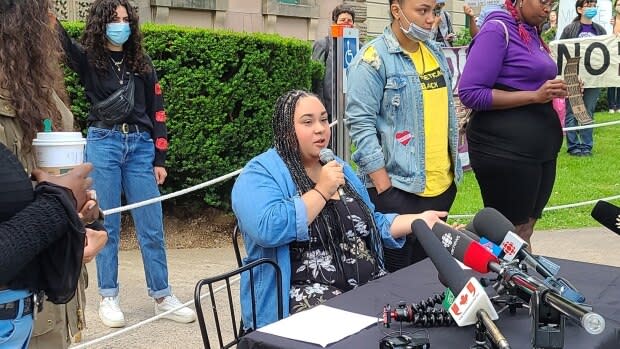Man hired to observe SIRT investigation into woman's arrest slams result
A Black man hired to watch Nova Scotia's police watchdog is slamming one of its decisions.
The decision found two white Halifax Regional Police officers did not use excessive force in the arrest of Santina Rao, a Black woman, in front of her children at a Halifax Walmart.
Tony Smith's contract with the Serious Incident Response Team involved "providing observations and recommendations about the investigation" to SIRT's director and lead investigator. SIRT was looking into the Jan. 15 arrest that left Rao with injuries that included a concussion and a fractured wrist.
Police and security guards accused Rao of trying to steal some produce after she placed the items in the bottom of her child's stroller.
The SIRT report said that Rao scratched the officer in the face during the arrest. When the officer took her to the ground, she scratched him again, which drew blood. Rao then struck the officer in the groin and he then struck her in the face.
Rao accused police of racial profiling and excessive force, but they were cleared by SIRT in a decision released Wednesday.

When SIRT's acting director, Pat Curran, brought Smith on board in February, Smith was a well-known advocate for Black voices. He was a commissioner on the public inquiry looking into abuse at the Nova Scotia Home for Colored Children.
Smith informed Curran "what I say is going to be through the lens of a Black person."
But the pandemic lockdown began barely one month into his work, and no arrangements were made for him to complete his job.
SIRT director Felix Cacchione returned to work in June. Smith had no say in the final report.
In his report, Cacchione wrote that "given the aggressiveness of the female, the actions of the officer in this matter were reasonable."
Charges against Rao of causing a disturbance, assaulting a peace officer and resisting arrest were dropped.
"I totally disagree with this [SIRT] decision," said Smith on Thursday, a day after the report was released.
"You don't even take the time to listen or to meet with me. That's totally disgusting to me as well, and that's what I think about his report."
What SIRT is saying
In a statement, Cacchione said Smith's role was to provide input into the investigation. Cacchione said he was not obliged to include it in his director's report or its conclusions.

Smith's position was created while Cacchione was off the job. Curran wanted to ensure the investigation, which involved a Black woman's treatment by white police officers, was given every opportunity to be viewed as fair, according to Smith. "He said that he's a retired white judge, there are white police officers investigating other white police officers, and that optic within itself doesn't look like it would be a fair process," said Smith.
Cacchione stands by his call to absolve the officers "as a result of a complete review of all the evidence."
Red flags
Smith's only briefing with SIRT's investigating officer was on Feb. 18, which raised several red flags for him. For the next couple of weeks, Smith went to Curran's office about a dozen times to review the file.
Smith said he was led to believe the statements obtained from the officers were done by SIRT. After reviewing the file, he saw it was HRP that gathered the statements.
Cacchione said officers under investigation are not required to give a statement or provide notes to SIRT. Despite that, one officer provided a written statement, while the other provided his report, notes and photos of his injuries, he said.
Smith was also concerned about information that stated one of the officers was racist.
Questioning the fairness of the investigation
Cacchione said that complaint was dealt with internally by the professional standards department of HRP. The allegation of a racist officer had no bearing on SIRT's investigation, said Cacchione.
Tackling racism within the justice system is something that drives Smith. He's part of the premier's design team that's addressing racism, inequality and systemic failures in the justice system.
Smith acknowledges he hasn't seen the full investigation. However, he questions its fairness.
"If you were looking at trying to somehow have me as a token, you got the wrong brother," said Smith.
'I believe her,' Smith says
Watching videos of Rao being taken down brought back memories of his own childhood trauma. He was a resident at the Nova Scotia Home for Colored Children, a home where he and many residents suffered physical, emotional and sexual abuse.
"When I see that video, these kids are traumatized," said Smith.
He has a message for Rao.
"I just want to let her know that I believe her, I stand by her," he said. "I went into this position to look at and to seek the truth and justice, and she was denied that justice by not really truly getting a fair investigation."
For more stories about the experiences of Black Canadians — from anti-Black racism to success stories within the Black community — check out Being Black in Canada, a CBC project Black Canadians can be proud of. You can read more stories here.

MORE TOP STORIES


